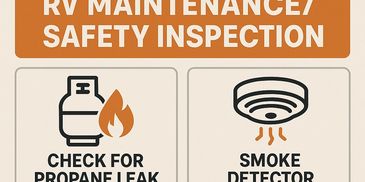Professional and Certified Comprehensive RV Inspections
Annual RV Safety Inspection

✓ Propane Leak Test
Leaks can cause fire or explosion. We pressure test your system and inspect every connection.
✓ Smoke and CO Detectors
Detectors fail without warning. We test them to make sure they’ll alert you when it matters.
✓ Emergency Exit Check
You need every emergency exit to open fast. We inspect and test each one.
✓ RV Hot Skin
✓ Propane Leak Test
Leaks can cause fire or explosion. We pressure test your system and inspect every connection.
✓ Smoke and CO Detectors
Detectors fail without warning. We test them to make sure they’ll alert you when it matters.
✓ Emergency Exit Check
You need every emergency exit to open fast. We inspect and test each one.
✓ RV Hot Skin Test
Get shocked touching your rig? You’ve got hot skin—live current in the frame. We test for it and find the source.
✓ Tires, Suspension, and Frame
We check tire condition, identify worn suspension components, and inspect for potential frame damage.
✓ Water Intrusion Inspection
Leaks destroy RVs. We check roof seals, slides, and undercarriage areas for hidden water damage.
✓ Electrical and Battery Check
We test your batteries, charging system, and wiring for safety and reliability.
Your RV is more than just another vehicle
Why Skipping an Annual RV Safety Inspection Puts You at Risk
An annual RV safety inspection by a certified RV inspector helps protect you, your passengers, and everyone else on the road. RVs combine propane, electrical, mechanical, and structural systems into a single moving unit, and failures in any one of those systems can have serious
Why Skipping an Annual RV Safety Inspection Puts You at Risk
An annual RV safety inspection by a certified RV inspector helps protect you, your passengers, and everyone else on the road. RVs combine propane, electrical, mechanical, and structural systems into a single moving unit, and failures in any one of those systems can have serious consequences.
A professional RV inspection identifies hidden safety issues before they turn into fires, breakdowns, or costly repairs.
Propane System Safety: Leaks Can Be Deadly
Propane powers critical RV systems, including the stove, furnace, and refrigerator. A propane leak can lead to fire, explosion, or carbon monoxide exposure — and leaks are not always detectable by smell.
During a certified RV safety inspection, the inspector:
- Pressure tests the propane system
- Checks hoses, fittings, and regulators
- Confirms proper operation and sealing
This ensures your propane system is safe, compliant, and functioning as designed.
Smoke, Carbon Monoxide, and LP Gas Detectors Save Lives
Life safety detectors are essential in every RV, just as they are in a home. Batteries fail, sensors degrade, and many detectors exceed their recommended service life (typically around five years).
A professional RV inspection verifies:
- Proper operation of smoke detectors
- Carbon monoxide (CO) detector functionality
- LP gas detector performance
- Correct placement and age of each unit
Early warning systems only protect you if they work.
Emergency Exits Must Open When Seconds Matter
Emergency exits, including rear windows and escape hatches, may be the only way out during a fire. One of the most common findings during RV inspections is sealed or stuck emergency exits.
Seals that aren’t opened periodically can fuse to the frame, preventing the exit from opening when it’s needed most.
A certified RV inspector:
- Opens and tests every emergency exit
- Checks for seal adhesion or obstruction
- Confirms smooth and safe operation
Electrical Safety and the RV “Hot Skin” Test
“RV Hot skin” occurs when electrical current leaks into the RV’s metal frame. This condition can result from improper grounding, damaged wiring, or faulty shore power connections, and it can cause serious injury or worse. An RV safety inspection includes testing for electrical leakage and verif
Electrical Safety and the RV “Hot Skin” Test
“RV Hot skin” occurs when electrical current leaks into the RV’s metal frame. This condition can result from improper grounding, damaged wiring, or faulty shore power connections, and it can cause serious injury or worse. An RV safety inspection includes testing for electrical leakage and verifying proper grounding to ensure your RV is electrically safe.
Tires, Suspension, Brakes, and Frame Integrity
Mechanical failures don’t just cause inconvenience, they can cause accidents. A Professional RV inspection evaluates:
- Tire condition, age, and wear
- Suspension components
- Brake condition (visual)
- Frame and undercarriage integrity
This helps reduce the risk of blowouts, brake failures, and structural issues while traveling.
Water Intrusion: Hidden Damage That Gets Expensive Fast
Water damage is one of the most costly problems RV owners face. Leaks often start small and remain hidden until significant damage has occurred. During an annual RV safety inspection, inspectors check:
- Roof and seam seals
- Slide-out seals
- Exterior penetrations
- Undercarriage areas
Early detection can save thousands in repairs and preserve the value of your RV.
Electrical Systems and Battery Reliability
Loose connections and failing batteries can lead to power loss, charging problems, or electrical fires.
During the RV Inspection process, a certified RV inspector checks:
- Battery condition and voltage
- Charging system operation
- Visible wiring and connections
- Proper power delivery throughout the RV
Reliable power is essential for safety and comfort.
Why You Need a Certified RV Inspector
A certified RV inspector is trained to identify safety risks that most owners overlook. An annual RV safety inspection isn’t just a recommendation — it’s a key part of responsible RV ownership.
You protect:
- Your investment
- Your safety
- Your passengers
- Other drivers on the road
We offer our Points of Inspection showing what is possible to address any concern of yours.
Copyright © 2026 Double Diamond RV Inspection - All Rights Reserved.